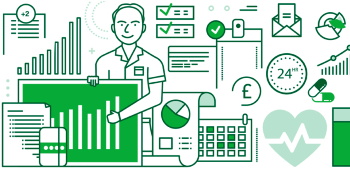Debt and money management
Whilst it is not always easy to admit, hundreds of thousands of people every year find themselves in a situation where they feel their finances are out of their control. This in turn can lead to anxiety, stress and family problems.
This page will help you to work out the options available to you if you are feeling like your money situation and debts have become unmanageable.
Taking control of your debts
This page explains how to prepare a budget, as well as information on how you can communicate with the people you owe money to. It will provide tips to help you pay back your debts in the right order.
The RCN is unable to offer FCA Regulated Debt Counselling. If you are seeking advice with consumer credit debts such as credit cards, bank overdrafts, and Hire Purchase then please use the links below for information on the steps you can take and to access support. You can also browse our Financial Wellbeing pages such as Money Troubles, which also has advice on where to get help and free support.
The RCN Welfare Service continues to offer advice and representation on welfare benefits and housing issues as well as un-regulated debts which include:
- Overpayment of wages
- Rental arrears
- Overpayment of NHS Pensions
- Overpayment of DWP Benefits
- Overpayment of HMRC Tax Credits
Getting an overview of your Financial situation
As soon as you start feeling anxious or concerned about your financial situation, it is important to take some time to do a proper overview of the money you have coming into your household and what your financial commitments are.
Once you have a clear understanding of your current financial situation, you can decide what steps need to be taken. A lot will depend on whether you have any money available to pay your creditors and if so, how much.
If you cannot maintain your contractual payments, one option may be to try and increase your income. You may be able to temporarily increase your hours or claim benefits you might be entitled to, or ask non-dependent children to contribute more to the household.
If you are unable to increase your family income sufficiently, you may also be able to reduce your outgoings by cutting back in certain areas – by looking at cheaper service providers or changing shopping habits.
What if you do not have enough money to pay your monthly contractual payments?
If it is not possible to maintain your contractual payments, and you do not have assets that could be released to pay off your debts, then you are what is known as insolvent. This means you will need to look at alternative strategies for dealing with your debt.
Your options will depend on your personal circumstances and where in the UK you live, so always seek advice before considering the possibilities.
For an overview of the options that might be suitable for your situation, please see:
- Money Advice Service: Options for Clearing your debts (England and Wales)
- Money Advice Service: Options for Clearing your debts (Scotland)
- Money Advice Service: Options for Clearing your debts (Northern Ireland)
If you can make full contractual payments, then it is important to pay off debts in the right order
Once you have got a clearer idea of what is happening in your financial world, it is important to review your debts. The consequences of not paying off some debts before others can be more serious.
If you’re struggling to make your repayments on time, you need to look at all your debts and split them into:
- debt emergencies.
- priority debts
- non-priority debts
What is a debt emergency?
If you’re facing a sudden emergency such as:
- court action
- bailiff action
- disconnection
- eviction for mortgage or rent arrears
then seek one to one debt advice as soon as possible.
Don’t struggle with debts alone, particularly if you’re facing an emergency such as losing your home or going to court. A debt adviser will often be able to talk to the court, bailiff or creditor on your behalf. They will also advise you on what to do next.
Always turn up to a court hearing. It gives you the chance to come to an agreement. If you don’t attend court, a decision might be made without taking into account information about your situation. If you are there, you can explain to the court the background to the situation, your current financial situation and try and negotiate an outcome that you can afford.
If you have to attend court, call the court to see if there is a court welfare service available on the day.
What are priority debts?
Priority debts are those that carry the most serious consequences if you don’t pay them.
These don’t have to be the largest or debts with the most expensive interest rates, but if you don’t pay them it could lead to serious problems.
For more information see How to prioritise your debts on the Money Helper website.
Why you should pay off priority debts first
The consequences of not paying off priority debts could be:
- being visited by bailiffs
- receiving a court summons
- having your heating or lighting cut off (e.g. due to unpaid bills)
- being made bankrupt
- losing your home (e.g. because you’re not keeping up with mortgage or rent payment)
Once you have reviewed your debts, if you find you are dealing with priority debts and don't know what options you have, then speaking to the RCN Welfare Service will provide you with the most appropriate choices for your next steps.
What are non-priority debts?
The consequences of not paying non-priority debts are less serious. If you don’t pay non-priority debts, your creditor could eventually take you to court or instruct bailiffs to collect money from you.
For more information see How to prioritise your debts on the Money Helper website.
How can the RCN Welfare Service help?
The RCN Welfare Service can offer advice and support with un-regulated debts such as:
- Overpayment of wages
- Rental arrears
- Overpayment of NHS Pensions
- Overpayment of DWP Benefits
- Overpayment of HMRC Tax Credits
To book an appointment with the RCN's Welfare Service, see our page on Booking an Appointment. Before contacting the service, we encourage you to see the RCN's Financial Wellbeing pages and complete any relevant online tools and checkers, as this may answer your query without the need to wait for an appointment.
For advice on regulated debt, see our Financial Wellbeing pages on Money Troubles, which has advice on dealing with debt, and where to get free debt advice.









